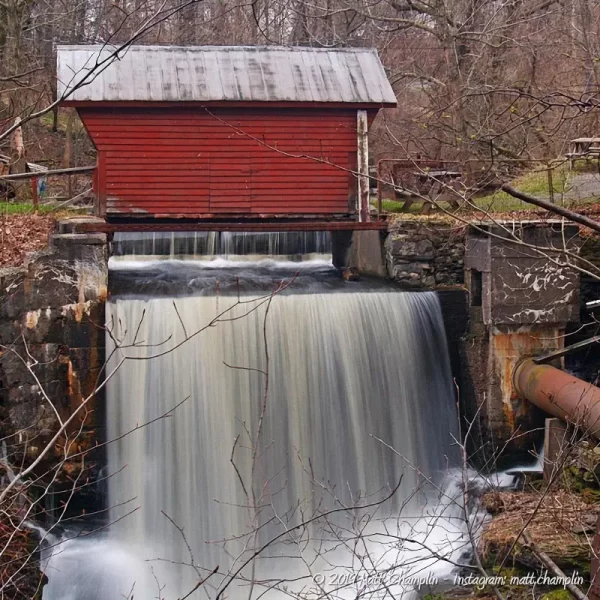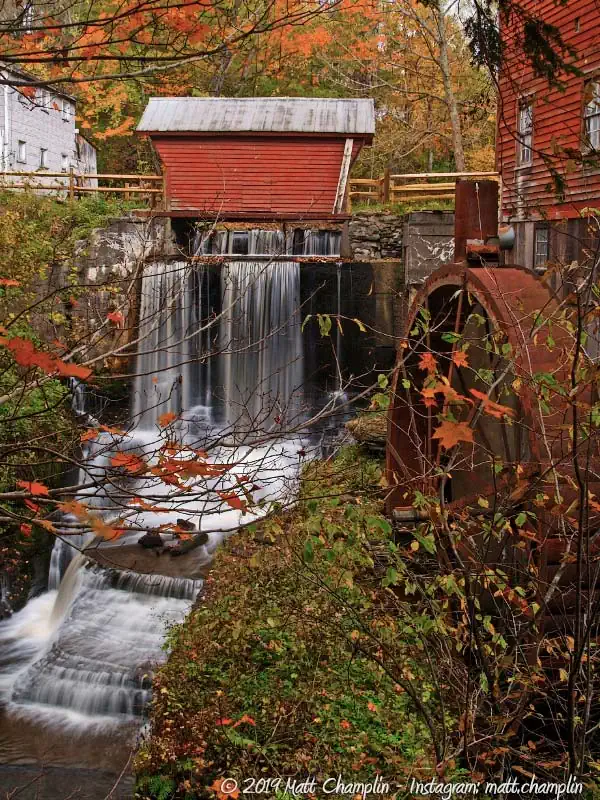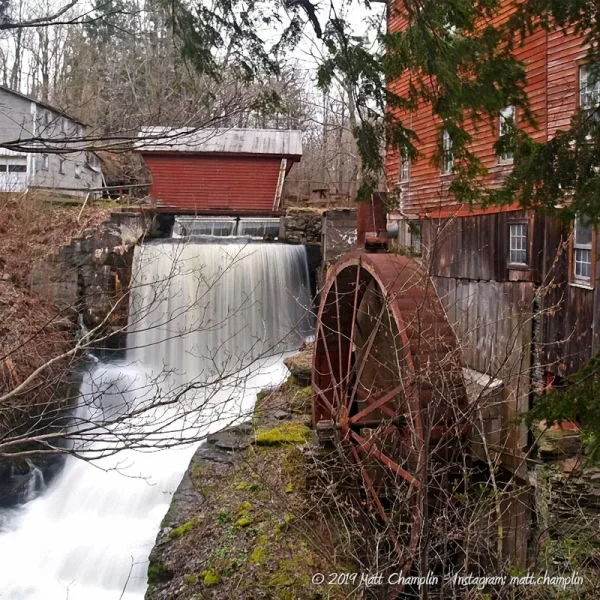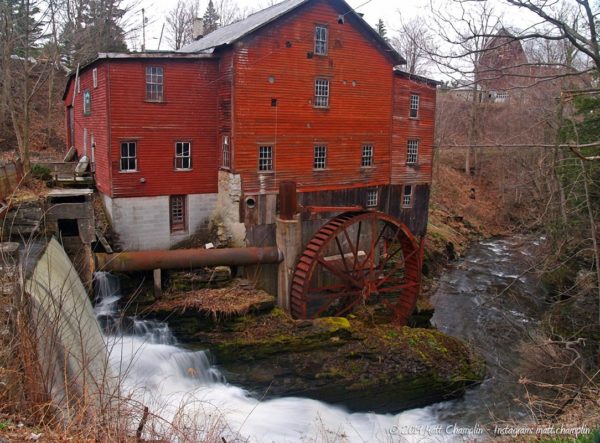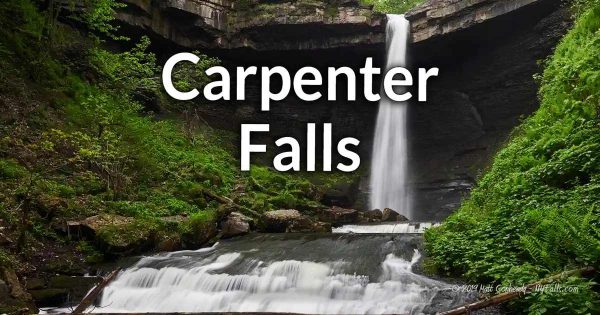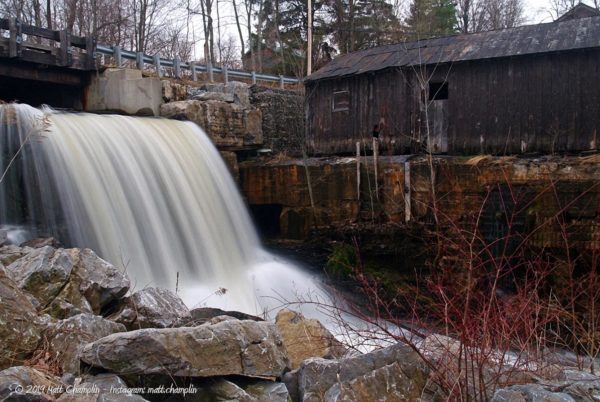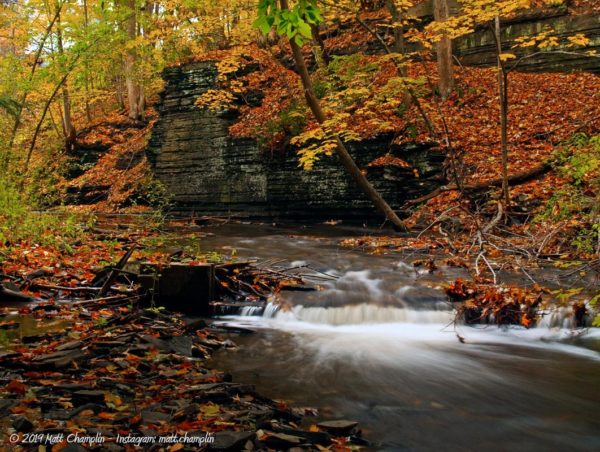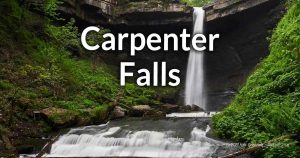New Hope Mills
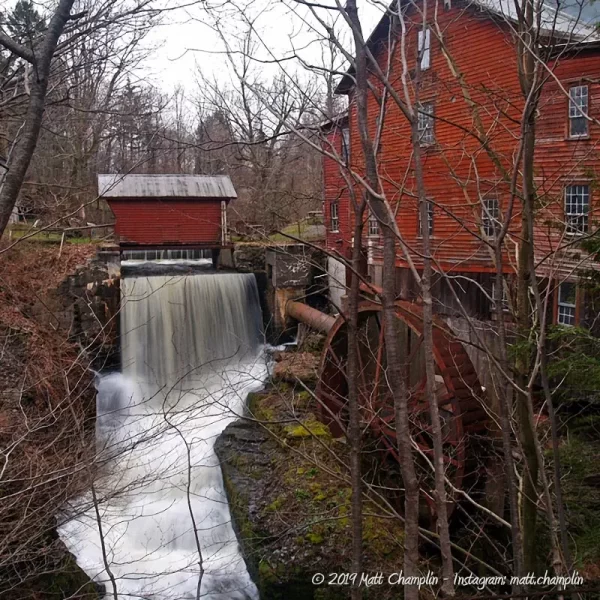
This location is currently OFF LIMITS. This information is preserved here for archival purposes. You should not visit this location without permission.
Location: 20 minutes south of the village of Skaneateles, in the town of Niles, Village of New Hope. On the west side of Skaneateles Lake, Cayuga County, New York.
Maps: Google Map; Topographic; Interactive.
GPS Coordinates:
- New Hope Mills Falls: N 42.79909 / W 76.34619
- Falls at Glen Haven Rd: N 42.79772 / W 76.34563
- New Hope Mills Building: N 42.79913 / W 76.34646
Directions: Take Route 20 towards Skaneateles until you reach Route 41A (west lake road). Travel south down West Lake Road 12 miles until you see a green sign for ‘New Hope’. Shortly thereafter, there will be a sign on the left for New Hope Mills. Take a left, and pull down a rough gravel road towards the mill.
Or use Google Directions.
Weather
Information / Accessibility / Accommodations
Description
The property is currently closed to visitors. This information is provided as a record.
New Hope Mills operated on this creek since 1823 and only recently relocated to a new production facility in Auburn. The old red mill, covered bridge, water wheel (and hidden power turbine under the mill) is still capable of operating today, although the mill has been decommissioned and New Hope Mills Inc. intends on preserving the site as an historic monument to mill manufacturing in New York. The place is currently private property and we are not sure who owns it.
The mill’s characteristic rustic red color, massive iron waterwheel, and tiny covered bridge make it a prime subject for photography as well as a study in the history of water power in this region. Although the waterwheel prominently hovers over the creek, and is capable of functioning, the mill’s real power comes from the water turbine underneath the mill. The turbine can run all year round provided there is sufficient water.
Just upstream, another historic water-powered facility, once a saw mill, sits by a large pond created by damming the Bear Swamp Creek. Its rustic appearance is true to its age. Although dilapidated, no longer working, and will probably not be standing for long, it is no doubt a beautiful step back to the days when mills dominated the creeks and waterfalls of upstate New York waters.
For those itching to try New Hope Mill’s awesome pancake mixes and flours (all made in the Finger Lakes) check local shops and grocers, or head 20 miles northwest to their outlet store in Auburn for the full selection, fresh out of the mill. Not in town? Buy online.
History
The flour mill was built by Judge Charles Kellogg. He was a member of the New York State Assembly (1808-09, 1821-22) and later reelected to Congress (1825). Judge Kellogg sold the mill to Horace Rounds in 1851. The mill remained in the Rounds family until 1947. The mill was then sold to Howard Weed, Hubert Latta, and Leland Weed; the mill became New Hope Mills at this time. Dale Weed became the sole owner in 2001 when David entered the presence of his Lord and Savior in Heaven.
The flour mill and a saw mill a short distance upstream are known as New Hope Mills Inc. There were 15 water powered industries along the banks of Bear Swamp Creek in the 1850’s. Now, only these two mills remain as a tribute to New Hope Mills’ unique past.
Local history contends that the community of New Hope was given its name from the top of its new flour mill in 1823. After the mill’s forty-foot, five-sided ridge pole was put in place, a man climbed to the top and threw a gallon jug of whiskey over his shoulder declaring the town of Sodom to be renamed to New Hope.
The mill originally contained three runs of stone and had a capacity of 200 bushels a day. In 1892, the mill began grinding with roller mills which are still in the mill today.
New Hope Mills has been a water powered industry from its beginning. The most visible item for water power is the overshot waterwheel. In 1972, the wheel was purchased from New Jersey. The wheel was about 100 years old and very rusted which made it necessary for the buckets to be rebuilt of wood. In 1978, the buckets were rebuilt of sheet-metal that would have been used in making Brockway fenders. It is jokingly known as the only Brockway waterwheel in the world.
In today’s modern, complex, and industrial society, the old fashioned way used here consistently produces quality without pollution! In fact, at New Hope Mills, the water is improved by its use; it is aerated as it passes over the waterwheel or through the turbine. The wheel does not put a drop of petroleum into the water because the wheel bearing is made of the rare wood Lignum vitae that has its own lubricant.

Hiking / Walking Trails
This is now private property and visitors are not allowed. The information here is kept up for historical purposes. Do not visit this site.
Difficulty: Easy
Markings: None.
Distance: Several hundred feet to see both mills.
Description: From the parking lot, cross the covered bridge over Bear Swamp Creek (and a small cascade) and view the mill from the side, along with the waterwheel and the 28 foot plunge. If you continue on the well defined path, you can walk further on about 50 yards or so and you’ll come to the seasonal waterfall and a unique area where you can view the mill and the waterfalls directly through the trees.
To access the upper falls, either walk or drive back up the road you came down until you reach the old sawmill that is right next to the bridge. Walk across the bridge, and down the hill on the opposite side of the first mill pond. You can get various views of the other waterfall from this area.
Map: Interactive.
New Hope Mills Falls Interactive Map
New Hope Mills Media


Interesting Stuff
Bahar Nature Preserve and Carpenter Falls
A few miles north along the creek lies one of the Finger Lakes Land Trust’s most prized treasures. This 25-acre woodland contains Carpenter Falls, the Bear Swamp Creek Ravine, and a 65-foot natural beach.
Photography Tips
The mills
- Although the falls are tempting to zoom in on, the historic mills should be the focus here. Try to include them and their rustic features in your scenes.
Overcast skies
- Daylight will cast uneven shadows and the late sun will leave it in the shade. It is best to wait for an overcast sky for this one.
Silky Water Effect
- To get that smooth cotton-candy look to the falls, you need to use a Neutral Density (ND) filter on your lens. The ND filter will block some of the light from entering the lens without altering the color, and thus allow your shutter to stay open longer. This blurs the water and creates a soft white gloss to the foamy areas of the falls. Check out the article for the all the details.
More tips
- See the Articles for more photography tips.
Who to Contact
No contact information available.

